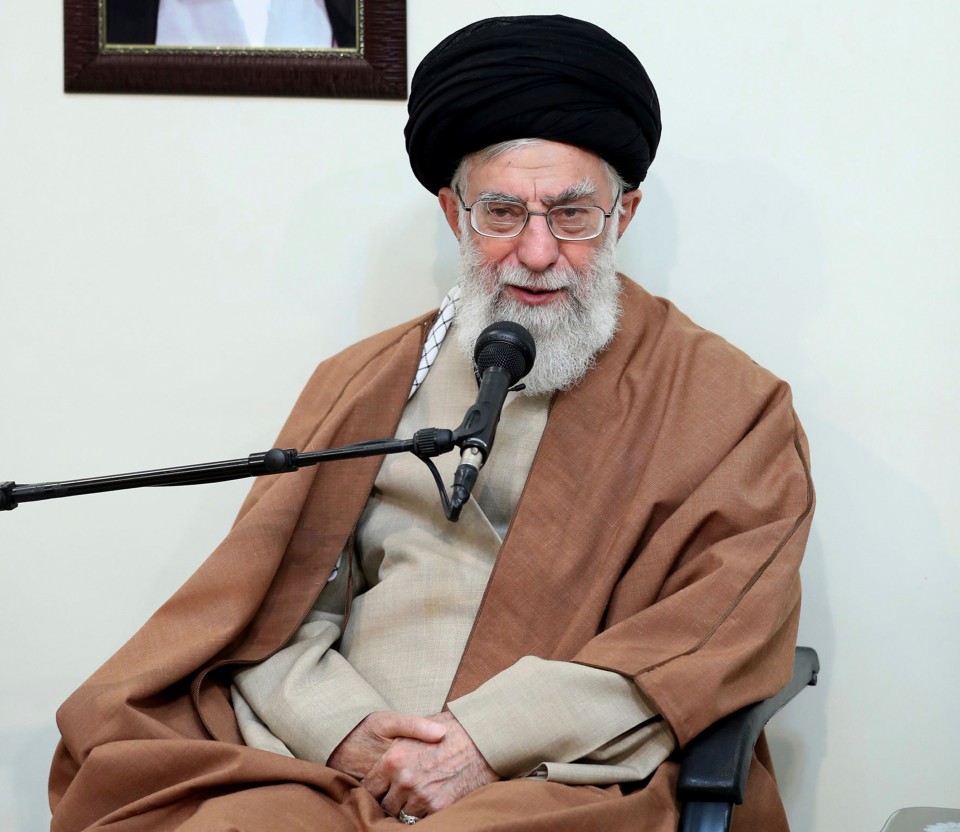Nathan Gardels is the editor-in-chief of Noema Magazine.
Abolhassan Bani-Sadr was the first president of the Islamic Republic of Iran. He now lives in exile near Paris. On Jan. 1, he spoke with WorldPost editor-in-chief Nathan Gardels about the current protests in Iran.
WorldPost: How do the recent eruptions of demonstrations and riots across Iran in recent days differ from the last eruption of this scale, the Green Movement, back in 2009? What are the implications?
Abolhassan Bani-Sadr: This movement is fundamentally different from the 2009 Green Movement in at least five ways.
First, the base of the movement is located outside the regime and is independent from foreign powers. Second, therefore, the main slogan of the Green Movement — “Where is my vote?” — is evolving into “Where are my rights?”
Third, the slogan “Independence, freedom, Iranian Republic” is a clear statement that they want to do away with the ruling regime, especially when it is combined with other slogans against dictatorship, such as “Death to the dictatorship,” “Death to [Iran’s supreme leader Ayatollah Ali] Khamenei,” and “Death to ‘Velayat-e Faqih’ [the doctrine of absolute rule by Islamic jurists].” The last is the linchpin of the regime.
Fourth, this time the movement is not confined mainly to Tehran but is in small and medium-sized cities around the country. Finally, the fact that people have begun a movement eight years after the Green Movement, and are saying, “Reformists, your tale is finished,” tells us they have reached a realization that the regime is not reformable and that the only way to reform is to do away with it. This tells us that the regime’s days are numbered.
WorldPost: President Trump has tweeted support for the protests. Do you think this intervention is beneficial?
Bani-Sadr: No. Trump has described Iranians as terrorists, and people who are around him and think like him are talking about disintegrating the country and supporting separatist organizations in Iran. Iranians have seen the destructive results of American intervention in countries like Iraq, Afghanistan, Libya and Syria. Also, is not the emerging pact between President Trump, Israeli Prime Minister Benjamin Netanyahu and Saudi Arabia’s ruling prince, Mohammed bin Salman, a pact for weakening Iran?
WorldPost: The regime claims that foreign powers are behind these protests and exploiting people’s legitimate grievances. Some even argue that there is a plan by these powers for the “Syrianization” of Iran. Do you think there is any truth in this?
Bani-Sadr: It would not be possible to turn Iran into another Syria without sending armed groups to Iran. Any Iranians who go along with this and commit such a crime will be fiercely despised within the country. Therefore, for foreign powers to attempt this would create a counterproductive folly from their standpoint.
However, we have seen that the ruling regime is already sending agents to commit violent acts in demonstrations and then use this as propaganda in order to scare Iranians into thinking a Syria-type civil war could happen there. But as the regime has inflicted widespread poverty on the majority of Iranians and so damaged the country through massive corruption and ineptitude, how can it scare people through such a tactic? The regime knows that in order to help Iran develop and prevent it from becoming another Syria, it needs to do away with despotism and turn Iran into a homegrown democracy. However, as the nature and structure of the regime makes it incapable of doing this, it tries to scare people into acquiescence.
WorldPost: Some protesters were heard chanting pro-monarchy slogans. What is your analysis of this?
Bani-Sadr: Some small groups, mainly in the cities of Mashhad and Qom, have been heard chanting pro-monarchy slogans. However, since these cities — in which the shah and his father committed bloodshed — played a pivotal role in overthrowing the monarchy, it seems apparent that agents of the regime have done this in order to frighten the people there. There is one section of Iranian society which, for various reasons, has monarchical tendencies. However, all indicators suggest that they are a very small minority.
WorldPost: What is your prediction for the outcome of the ongoing protests?
Bani-Sadr: Any movement, like a newborn baby, needs to be looked after and saved from dangers. If dangers are not dispelled, the movement could be repressed and the regime could implement its plans, especially for Ayatollah Khamenei’s conservative successor. But if the dangers are dispelled and the movement becomes widespread, there is hope.
Here are the three dangers I see:
First, if the protests become violent, they will fail. Second, if the slogans do not become clear and form around human rights of citizens, then the movement will not become widespread in a way that cuts through class, gender, ethnicity and religious belief. In that case, it also will fail. Third, if the fear of outside intervention by the Trump administration and those allied with him who advocate for the disintegration of Iran — namely Saudi Arabia and Israel — becomes strong enough, it will prevent a majority from sympathizing and joining the protests. In this sense, Trump’s tweets only serve to deflate the movement.
This was produced by The WorldPost, a partnership of the Berggruen Institute and The Washington Post.




